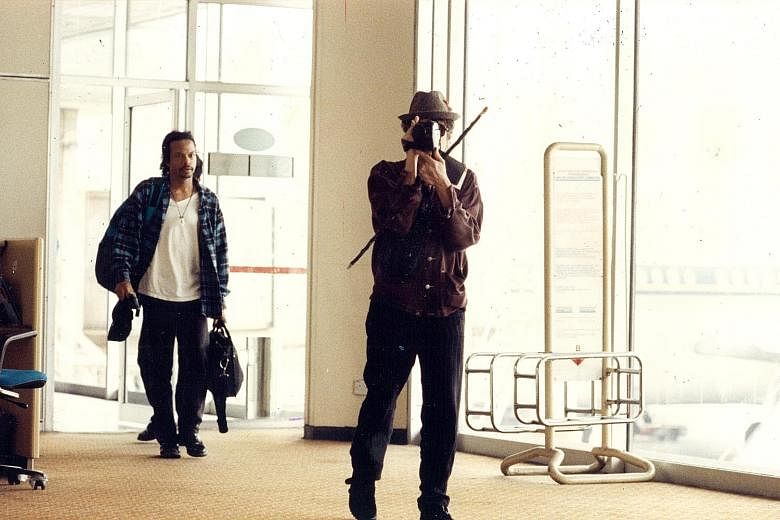When rock legend Bob Dylan did shows in Malaysia and Singapore in early 1994, The New Paper asked if I could interview him. They never had to ask - it was a dream assignment.
Growing up in the 1960s in a country transfixed more by a young Dylan's words than his music or fingernails-on-a-blackboard voice, he inspired me to become a writer. Listening to his colourful lyrical acrobatics in songs such as Like A Rolling Stone and Mr Tambourine Man, I went on to edit - and write most of - my high school literary magazine, while also working for the school newspaper and yearbook. I've been writing ever since.
Now the whole world knows Dylan's greatness. Not just rock stars, but novelists and poets around the world are singing his praises after he was awarded the Nobel Prize for Literature last Thursday.
Now 75, Dylan was honoured "for having created new poetic expressions within the great American song tradition", said the Swedish Academy, which gives out the Nobel awards.
No less than author Salman Rushdie, himself not yet a Nobel winner, hailed Dylan as a "great choice". United States President Barack Obama also congratulated Dylan, describing him as "one of my favourite poets".
American author Joyce Carol Oates even managed, aptly given Dylan classics such as Master of War, to inject a political note into her tweet of praise: "Bob Dylan a very welcome respite/ interregnum interrupting cascade of T***p grotesquerie. the Dylan of 1960s would've been scathing of T***p", she wrote, intentionally leaving the "rum" out of her target's name.
Of course, the choice of Dylan for such a prestigious prize also raised some eyebrows and ire in the writing community. Joining such literary giants as Rudyard Kipling, Thomas Mann, Ernest Hemingway, T. S. Eliot and Gabriel Garcia Marquez, he became the first musician ever to win it. That has rankled some authors worried that it might open the door to a flood of literary awards for John Lennon, Paul McCartney, Leonard Cohen, Kanye West and other popular music-makers to the detriment of their own community who do not rely on catchy tunes or riffs to tell their stories.
Dylan, who got his start as a protest singer with such classics as Blowin' In The Wind, would no doubt welcome the controversy.
Scotland's Irvine Welsh, who wrote the novel Trainspotting that was later turned into a movie, was downright angry when he heard of the award.
"I'm a Dylan fan," he wrote on Twitter, "but this is an ill-conceived nostalgia award wrenched from the rancid prostates of senile, gibbering hippies."
Welsh went on to pose a rhetorical question with an obvious answer: Has author Don DeLillo, whose novel Cosmopolis was turned into a film by David Cronenberg, been inducted into the Rock and Roll Hall of Fame, built here in my hometown to honour music-makers like Dylan?
American author Jodi Picoult riffed on a similar theme, wondering if the choice of Dylan meant she could now win a Grammy, music's version of the Oscar.
As Rushdie noted on Twitter, however, in his support of Dylan for the Nobel: "From Orpheus to Faiz, song & poetry have been closely linked. Dylan is the brilliant inheritor of the bardic tradition. Great choice."
Three years ago, former National Public Radio critic and Salon arts editor Bill Wyman, no relation to a certain ex-Rolling Stone, was already saying he felt Dylan's way with words was deserving of a Nobel prize for literature.
Dylan's "lyricism is exquisite", said Wyman. "His concerns and subjects are demonstrably timeless; and few poets of any era have seen their work bear more influence."
The permanent secretary of The Swedish Academy, Dr Sara Danius, told AFP: "If you think back to Homer and Sappho, you realise that was also aural poetry. It was meant to be performed, together with instruments, but we still read them, 2,500-some years later... And in much the same way you can read Bob Dylan too."
In fact, the academy has reached beyond the boundaries of books in choosing its literature winners before, notably in 1953 when it gave the Nobel to honour Britain's Winston Churchill for speeches he delivered during World War II.
As for Dylan himself, he has yet to acknowledge winning the Nobel. He was doing what he does, playing to a full house in Las Vegas when the award was announced. Singer Bob Neuwirth, a longtime friend, noted: "He may not even acknowledge it."
That comes as no surprise to me.
My story for The New Paper on Feb 24, 1994 came with my suggested headline Stalkin' Bob Dylan Blues - a twist on a song he spoke through rather than sang called Talkin' Bob Dylan Blues.
Although I asked his manager if I could get an interview, and kept asking, and spent several days practically breathing down Dylan's neck in Kuala Lumpur, even in an uncrowded lift, an interview never did materialise.
Dylan has always preferred to let his songs speak for him.
SEE LIFE

